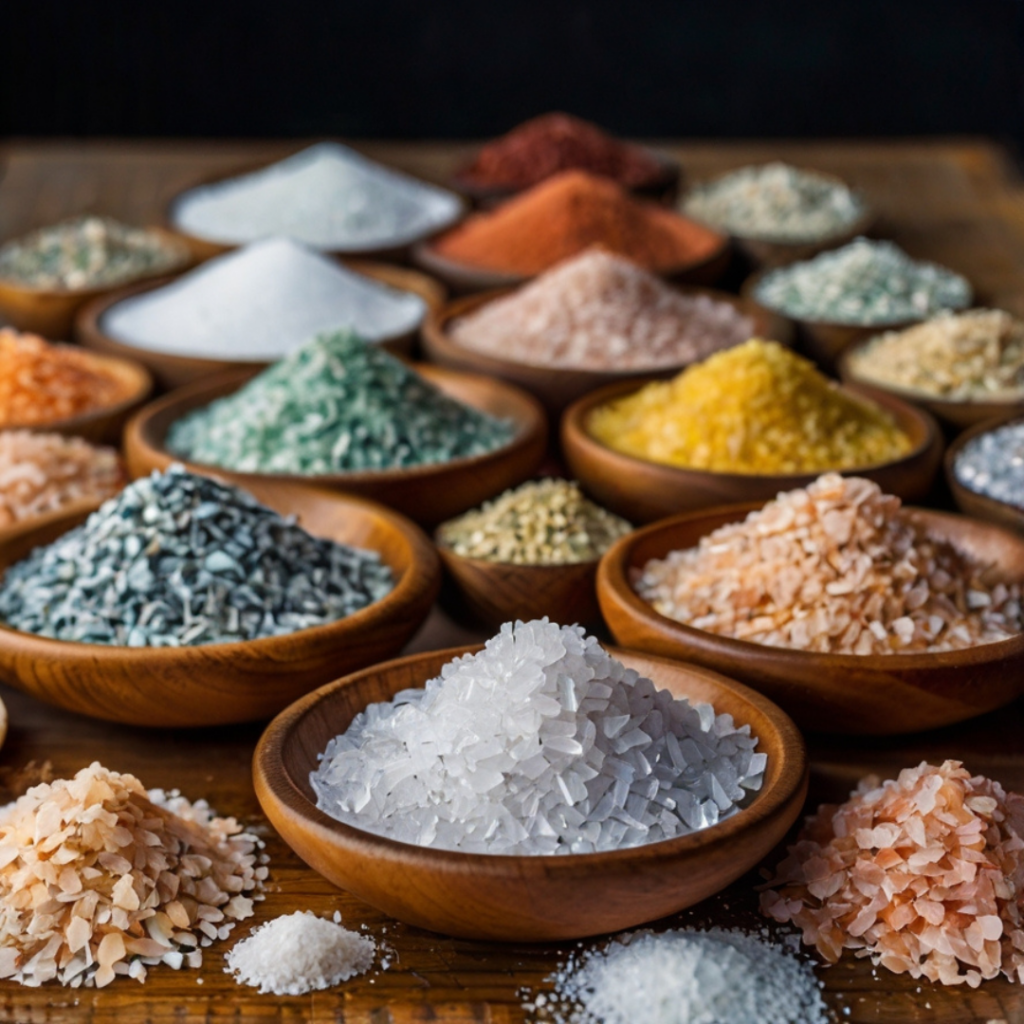
Salt is an essential mineral, but it’s also one of the most misunderstood ingredients in the modern diet. Not only is it necessary for life, playing a key role in regulating fluids and helping transport water into our cells, but it can also be harmful in excess, leading to issues like hypertension and heart disease. The challenge is understanding the different types of salt and why some may be better for your health than others.
In this article, we’ll explore the different kinds of salt, why your choice matters, and why it’s important to monitor both the quantity and quality of the salt you consume.
Why Does the Body Need Salt?
Before diving into the types of salt, it’s crucial to understand why your body needs it. Sodium, a key component of salt, is essential for several important functions, including:
- Fluid balance: Sodium helps regulate the amount of water in your cells, ensuring proper hydration.
- Nerve transmission: It plays a vital role in transmitting electrical signals in the nervous system.
- Muscle contraction: Sodium helps muscles, including the heart, contract effectively.
While sodium is necessary for these bodily functions, modern diets typically provide far more sodium than the body requires. The American Heart Association recommends no more than 2,300 milligrams of sodium per day, yet most people consume more than 3,400 milligrams daily. Excess sodium intake can lead to health problems like high blood pressure, heart disease, and stroke. However, the type of salt you consume may also play a role in your overall health.
The Different Types of Salt: Good vs. Bad
There are several types of salt available, and while they all contain sodium, their mineral content, processing methods, and impact on health vary widely.
1. Table Salt (Refined Salt)
- What it is: Refined or table salt is the most common form of salt found in households and processed foods. It’s highly processed, often stripped of minerals, and has added anti-caking agents and sometimes iodine.
- Why it can be bad: The heavy processing means table salt lacks beneficial trace minerals. Plus, its widespread use in processed foods leads to overconsumption, contributing to high sodium intake and associated health risks like hypertension.
- Key takeaway: Table salt should be used sparingly and monitored closely due to its highly processed nature and lack of nutritional value beyond sodium.
2. Sea Salt
- What it is: Harvested through the evaporation of seawater, sea salt retains some trace minerals like magnesium, calcium, and potassium. It’s less processed than table salt, but still high in sodium.
- Why it’s better: The trace minerals in sea salt can offer small health benefits, and the larger crystals may provide more flavor, potentially encouraging people to use less. However, it’s important to note that the sodium content is still high.
- Key takeaway: While sea salt has more minerals than table salt, moderation is key as the sodium content is still substantial.
3. Himalayan Pink Salt
- What it is: Mined from ancient sea beds in the Himalayas, this salt is celebrated for its pink color, which comes from iron oxide. It also contains trace amounts of calcium, magnesium, and potassium.
- Why it’s often considered better: Advocates of Himalayan pink salt believe it’s a purer option, free from pollutants and containing additional minerals that may support health. Its coarse structure can also enhance flavor, allowing you to use less overall.
- Key takeaway: While Himalayan pink salt has trace minerals that can be beneficial, it’s still high in sodium. Its mineral content should not be relied upon for nutritional needs, but it’s a better option than heavily refined table salt.
4. Kosher Salt
- What it is: Kosher salt has larger crystals and is often used in cooking due to its texture and ability to draw moisture from foods. It’s typically free of additives.
- Why it’s considered good: Kosher salt is minimally processed and doesn’t contain as many additives as table salt. Its larger crystals make it easier to pinch and sprinkle on foods, which may help users control their sodium intake.
- Key takeaway: Kosher salt can be a good option for those looking to reduce sodium since its larger crystals pack more flavor with less actual salt per pinch.
5. Celtic Sea Salt
- What it is: This salt is harvested from the coastal areas of France using ancient Celtic methods. It retains its natural minerals and is often moist, giving it a unique texture.
- Why it’s beneficial: The high mineral content of Celtic sea salt, including magnesium, calcium, and potassium, makes it a more nutrient-dense choice. Its lower sodium content compared to refined salts means it’s a healthier option overall.
- Key takeaway: Celtic sea salt is a good choice for those looking for a salt that provides trace minerals and helps with hydration while being lower in sodium than more refined salts.
Why Salt Choice Matters: Beyond Sodium Quantity
While the amount of sodium you consume is critical for health, the type of salt you choose can also make a significant difference. Here’s why:
1. Trace Minerals Can Support Health
Unrefined salts like Himalayan pink salt and Celtic sea salt contain trace amounts of minerals like magnesium, calcium, and potassium, which are beneficial for overall health. While the quantities are small, they contribute to electrolyte balance and support various bodily functions.
For instance, potassium helps to counterbalance sodium’s effect on blood pressure, while magnesium plays a role in muscle and nerve function. These minerals can make unrefined salts a better option than highly processed table salt.
2. Less Processed Salts May Help You Use Less
Salts like kosher and sea salt often have larger crystals, which provide a stronger burst of flavor. This allows you to use less salt while still achieving the same level of seasoning, potentially reducing overall sodium intake.
3. Reducing Toxins and Additives
Many refined salts contain additives like anti-caking agents and even trace microplastics from pollution in sea salt. Opting for salts that are less processed and sourced from cleaner environments, like Himalayan pink salt, can reduce your exposure to these substances.
Choosing the Right Salt for Hydration and Health
While reducing sodium intake is crucial for heart health, it’s also important to choose salts that support hydration and cellular function. Sodium helps the body retain water and allows for the movement of fluids into cells, which is why it’s essential to maintain a healthy sodium balance. However, this doesn’t mean consuming excess sodium is beneficial.
Choosing unrefined salts that retain essential minerals—such as Himalayan pink salt or Celtic sea salt—can help promote proper hydration, especially when combined with a diet rich in potassium and magnesium. These minerals help balance sodium’s effects, ensuring that your body stays hydrated without retaining excess water, which can lead to bloating and high blood pressure.
Conclusion: Salt in Moderation and Choosing Wisely
Although the body needs sodium, the type of salt and the amount consumed make all the difference. Highly processed table salt, while common, offers little nutritional value beyond sodium, and its widespread use in processed foods contributes to overconsumption. On the other hand, unrefined salts like Himalayan pink salt, Celtic sea salt, and kosher salt offer a richer mineral profile and may help you reduce your overall sodium intake.
When choosing a salt, think beyond just taste and convenience. Opt for minimally processed, mineral-rich salts that can support hydration and overall health while keeping your sodium intake in check. After all, it’s not just about cutting sodium—it’s about making smarter choices for your long-term well-being.
Sources:
- American Heart Association (AHA) – Sodium Guidelines
- World Health Organization (WHO) – Reducing Salt Intake
- Harvard Health Publishing – Sodium and Your Health






